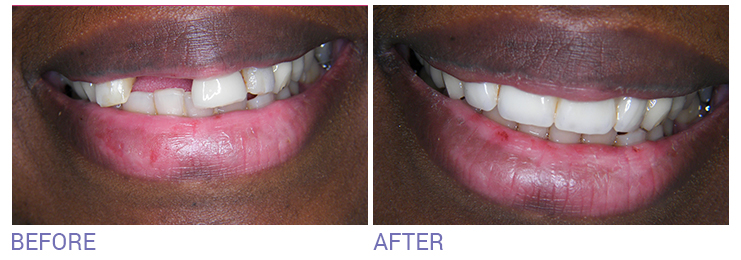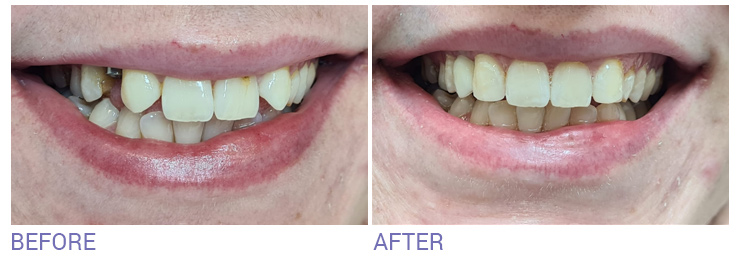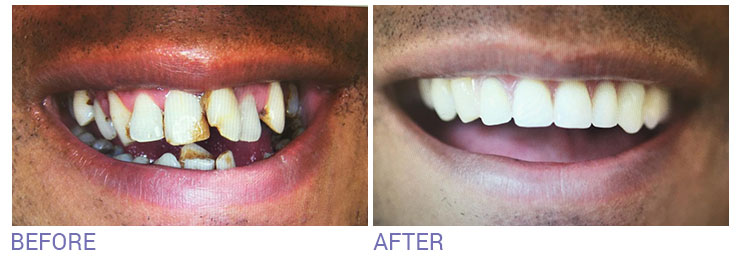33 Abbey Parade, Wimbledon, London SW19 1DG
33 Abbey Parade, Wimbledon, London SW19 1DG
One of the most common dental procedures conducted in London is the dental implant to tackle the problem of missing teeth. The use of new materials and new techniques in the field of dental implants has revolutionised this field of dentistry over the past years, offering replacement of teeth from their roots, with strong and natural looking replacements.
Our professional and experienced team of specialists, dentists and other personnel will ensure that your experience with us is as comfortable as possible, and your treatment is completed with minimum level of pain. Our clinic in Wimbledon also welcomes patients from other areas such as Richmond, Raynes Park, Tooting and Kingston.
The cost for implant treatment will depend on the condition of your jawbone and gums, and the number of teeth that are missing. However, the base price of all our procedures are listed on our price page.


Loss of teeth is a very common problem, affecting people at different stages of life. It can significantly damage a person’s smile and their confidence. More importantly, missing one tooth or more can also reduce the optimal function of your remaining teeth, by reducing your chewing power and biting force. For many, this dental issue can bring with it frustrating limitations to diet.
Like all medical and dental conditions, it is never a good idea to ignore the problem. By neglecting a dental issue such as missing teeth, not only will the appearance of your smile and the function of your teeth be compromised, but the stability of neighbouring teeth may also be affected. Teeth on the same side of the jaw as a missing tooth will eventually loosen and eventually fall out. Your gums and bone at the site of missing teeth will start to be lost, making any future corrective treatments harder.

Dental implants are titanium posts with specially activated surfaces. They are placed (implanted) into your jawbone to function in a similar way to a natural tooth root. Your bone grows into the implants in a process called OSSEOINTEGRATION. After a few months the implants will form a permanent part of your body, provided that there are no complications.
Present day implants have shown a success rate of more than 90%. Many dentists now agree that implants are one of the most predictable forms of dental treatment, and in most cases it is a long-term solution. More than half a million people receive dental implants every year.
X-rays, and sometimes CT scans, will be needed to see if you have sufficient quality and quantity of bone. Conditions such as uncontrolled diabetes, HIV or leukemia can affect the bone growing onto the implant and will need careful assessment. In general, most people are suitable candidates for implants.
A small procedure will be necessary. It’s usually possible to place the implants in the dentist’s rooms. In some cases a general anaesthetic is preferable, and this will require a visit to a medical clinic or hospital. Some patients do experience one or two days of discomfort after the procedure, which is usually related to the stitches.
An accurate estimate can be obtained from your dentist or dental specialist.
The youngest patients receiving implants are in their late teens, and the oldest in their nineties. When there are missing teeth, the jawbone often shrinks. This is common with denture wearers, and the ridge which is important for holding the denture gradually disappears, affecting the fit of the denture.
Dental implants restore the normal loading of the bone and prevents further loss of bone. The sooner you decide to have implants placed, the less bone loss is experienced, enabling your dentist to achieve a better aesthetic result.
Implant treatment is a technical and complex form of dentistry. Not all dentists wish, or are trained, to provide implant treatment. The surgery (placing of the implant) is done by a maxillo-facial and oral surgeon, a periodontist, or a dentist. The design and construction of the artificial teeth is done by a dentist or prosthodontist working in conjunction with a dental technician.